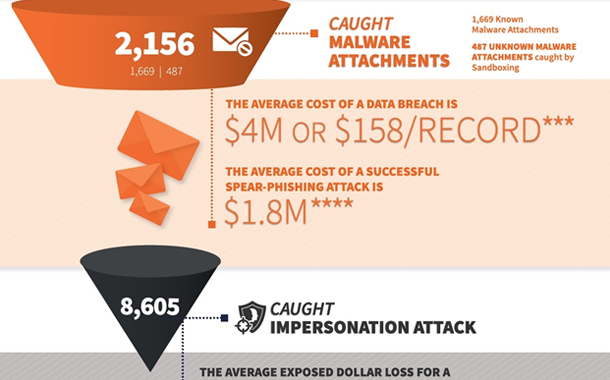Current Email Security Systems Missing Thousands of Known and Unknown Attacks
Mimecast Limited announced the most recent quarterly release of the Mimecast Email Security Risk Assessment (ESRA), a test which measures the effectiveness of email security systems currently in use by thousands of organizations globally. In its second quarterly assessment, Mimecast found that both known and unknown attacks, as well as spam, are continuing to get through incumbent email security systems. In addition and of particular concern, are emails that contain no malware, and instead rely on duping recipients into responding to a request that usually involves sending the attacker money or highly monetizable data. These points were addressed in a January 2017 commissioned Forrester Consulting study titled, Closing the Cloud Security Email Gap, which recommended that organizations engage with a trusted third-party security vendor to more effectively close the gap with their email security.
In comparison to the data initially reported in the February 2017 ESRA, the number of impersonation attacks detected this quarter rose more than 400 percent quarter over quarter. Impersonation attacks consist of social engineering heavy emailsthat attempt to impersonate a trusted party such as a C-level executive, employee or business partner. This simple method of attack is being exploited at an alarming rate as it can be used to dupe recipients into initiating wire-transfers and sending back other sensitive data leading to significant financial loss– as evidenced by widely publicized recent attacks. In fact, a public service announcement issued by the Federal Bureau of Investigation (FBI) stated that between October 2013 and December 2016 business email compromise scams resulted in a total loss of more than $5.3 billion US dollars. Between January 2015 and December 2016 alone, there was a 2,370% increase in identified exposed losses.
This latest ESRA reflects findings from inspecting the inbound email for more than 44,000 users over a cumulative287 days received by participating organizations. In aggregate to date more than 40 million emails have been inspected by Mimecast all of which had already passed through the incumbent email security vendor or cloud email service in use by each organization. The ESRA test uncovered almost 9 million pieces of spam, 8,318 dangerous file types, 1,669 known and 487 unknown malware attachments and 8,605 impersonation attacks. The data reinforces the concerning reality that the industry must work towards a higher standard of email security, as 90 percent of attacks start with email. In general, organizations everywhere are struggling with prolific ransomware attacks, like Locky.
“Cybercriminals are constantly adapting their attack methods. For instance, this latest ESRA analysis reflects how impersonation attacks are getting through existing email security defenses at an alarming rate. If a CISO isn’t reviewing its current email security solution on a 12-18 month basis, they may be surprised at what threats are now getting into employees’ inboxes,” said Ed Jennings, chief operating officer at Mimecast. “At the same time, email security providers need to ensure they’re doing their due diligence to protect customers from new attacks, whether they be advanced or simple. The Mimecast ESRA results show a clear need for the security industry to come together in the fight against email-borne threats.”


